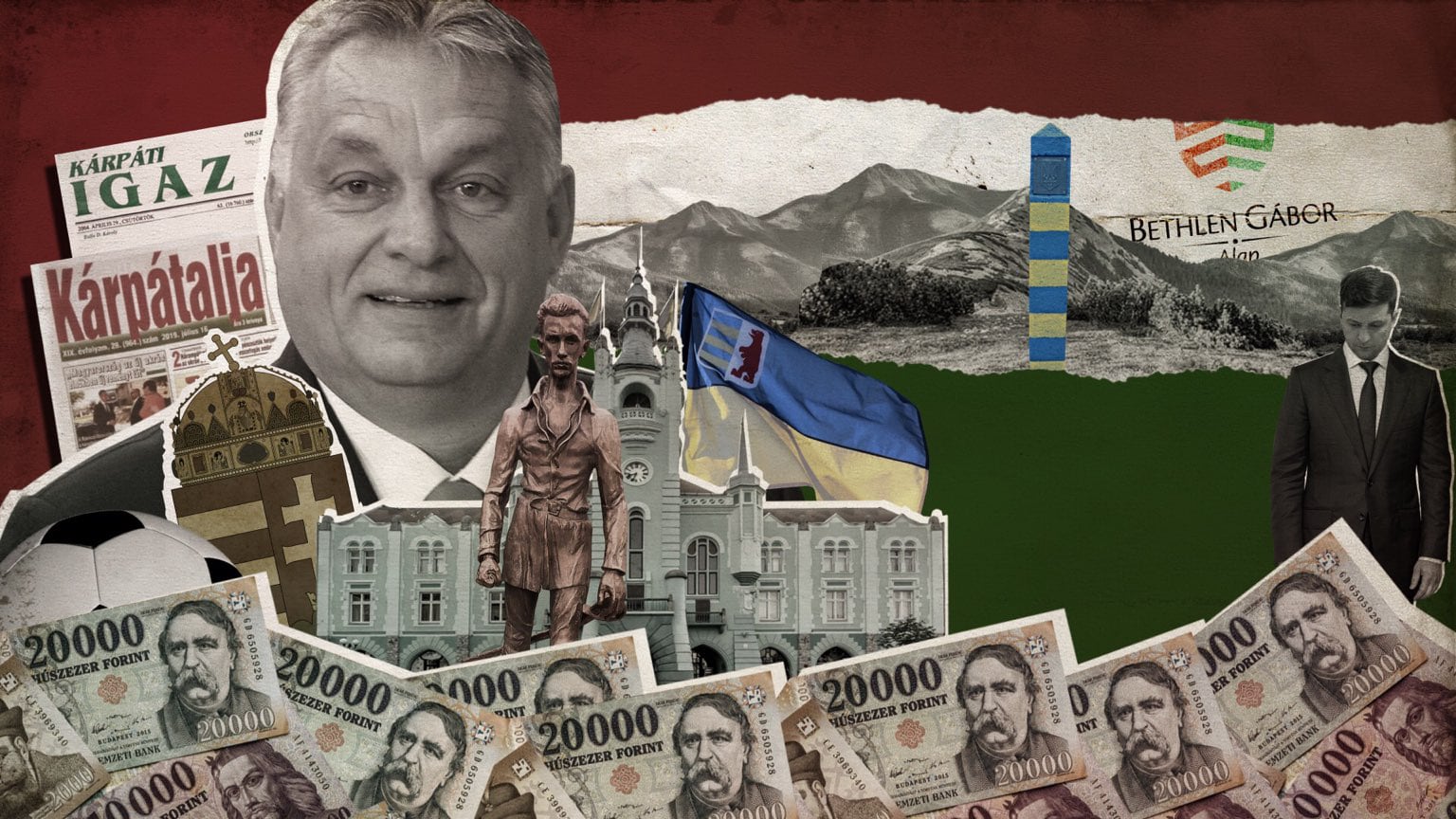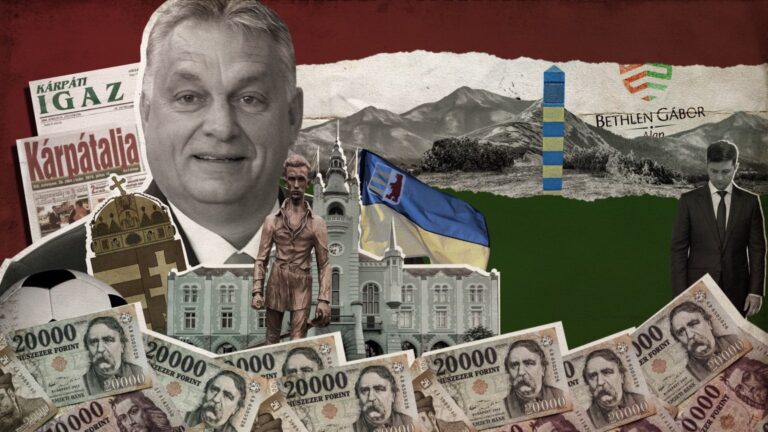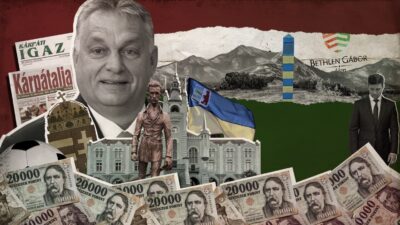by Valeriya Iegoshyna
Zakarpattia is a peculiar region of Ukraine: it is the country’s smallest oblast yet borders four European states. Every tenth resident of the region considers themselves a Zakarpattia Hungarian. But it is the government of a neighboring state that makes this region very special.
Viktor Orbán’s government in Budapest invests billions of forints every year in Hungarian communities in neighboring countries, including in Ukraine. Over a recent 10-year period (2011–19) one Hungarian government agency alone, the Gábor Bethlen Fund, has approved grants of at least 1.1 billion euros to Hungarian minority organizations abroad. If special purpose funds are included, the total sum of money sent to such organizations amounts to 1.35 billion euros. However, less than two-thirds (62%) of this money is recorded in the Hungarian government’s online national grant database. Where more than one-third of this money goes is a mystery. To say the least, this investment program is not fully transparent. Money from the pockets of Hungarian taxpayers flows mainly into Romania, Slovakia, and Ukraine, and to lesser extent into Serbia, Slovenia, Croatia, and other countries.
Funds from Budapest have supported cultural organizations, churches, the renovation of schools and kindergartens, media outlets, and football clubs. Tens of thousands of euros have also ended up in the bank accounts of organizations connected with Hungarian minority politicians. Many of the funded activities have raised questions, as the supported cultural and social activities are often closely intertwined with politics.
Members of Schemes, a team of Ukrainian investigative journalists (a joint project of RFE/RL’s Ukrainian Service and UA: Pershyi, a Ukrainian public broadcaster), were invited by the Investigative Center of Jan Kuciak (Slovakia) and CINS (Serbia), which provided the data, to analyze the situation in Ukraine. This article follows up on an earlier international investigative journalism project, Hungarianmoney.eu, which was carried out by Átlátszó Erdélyi (Romania), the Investigative Center of Jan Kuciak, Daily SME (Slovakia), CINS (Serbia), and Oštro (Slovenia, Croatia). Despite repeated requests for comment, the fund did not answer the Schemes journalists’ questions concerning public spending, discrepancies in real and official figures related to grants for the Hungarian diaspora, and other related issues.
What activities in Zakarpattia are supported by Hungarian money? Who are the official recipients? Will this large-scale Hungarian campaign launched in a border region have tangible political consequences in the future for the whole of Ukraine, which has already suffered greatly from the separatism instigated by its neighbor to the east, Russia? To answer these questions, Schemes sent out a group of reporters to Zakarpattia.
Uzhgorod. Café Pid Zamkom. The owner of the establishment, a Zakarpattia Hungarian named Yurii Rusnak, shows the journalists around and tells his family’s story.
“My family is multinational; my mother was born in Zakarpattia. She served as a nurse on the frontlines. She was wounded twice. My father lived in a Hungarian village. He was in the Hungarian army because this region was controlled by Hungary then, so he simply could not be in another army. He would have been deemed a deserter,” recalled the man. “They met after the war, lived a very peaceful life, and loved each other their whole lives, even though my father spoke neither Ukrainian nor Russian. Love wins. Love is a huge power.”
Elaborating on his business, he said, “I do not want to die rich. One can live a reasonable life with only a bit of money. It is impossible to receive money from the Ukrainian state, even in a bank.”
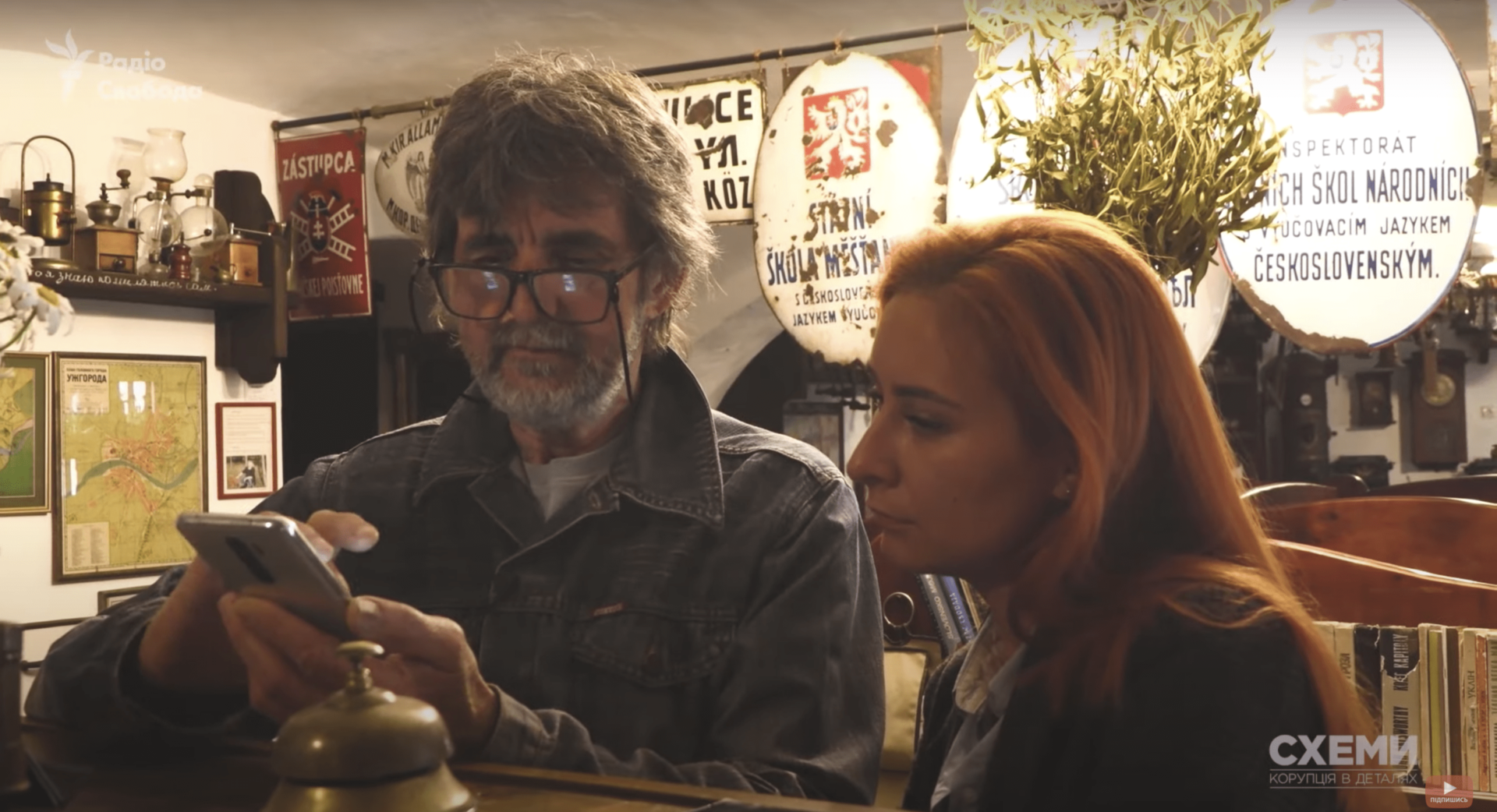
Yurii Rusnak with Schemes journalist in his cafe. Source: Schemes
But his café is open thanks to a Hungarian support program. “I bought a dishwasher, a coffee maker, and these two fridges,” Yurii said, pointing to the kitchen appliances he purchased with Hungarian money. “Frankly speaking, it was very tough without these [appliances]. Hungarians support Hungarians throughout the whole world.”
Yurii is not the only Ukrainian citizen to have received Hungarian funds. Tens of thousands of Zakarpattia’s inhabitants have benefited from Budapest’s grant program, which encompasses several charity funds.
How much has been given out and to which causes? What is Hungary’s rationale for investing in its neighbor, Ukraine? How does this inflow of money affect life in the region? Will this process have any nationwide impacts in this country which is already wrestling with a separatist movement encouraged by another of its neighbors, Russia?
The Schemes team embarked for Zakarpattia to find out.
Hungarian grants
The Hungarian influence is evident when strolling through the towns of Zakarpattia – signs are often written in Hungarian, and the Hungarian tricolor can sometimes be seen flying. But the influence is not limited to just cultural heritage. The Orbán government provides money to support every aspect of Hungarian life here, from education to faith.
Churches funded by Hungary are easily recognizable in Zakarpattia because of the mandatory service timetables in the Magyar language, not to mention the fact that times are given in Central European Time, that is, Budapest time, not Eastern European Time.
In the last 10 years Zakarpattia parishes have received 6.8 billion forints, or nearly 22 million euros, and that is from one fund only. This figure does not include funding for church-organized activities such as summer camps for children or language courses.
Where are these numbers sourced from?
Investigative journalists from several European countries joined forces to work on one massive project together – Hungarian Money, Orbán’s Control. They received and analyzed massive amounts of data on the funds that regularly flow from Budapest to the Hungarian diaspora and have published their findings on Orbán’s rising influence in neighboring countries.
Karin Kőváry-Sólymos, a journalist from Slovak public broadcaster RTVS, took part in the project.
“Our main goal with this whole project was to show the diaspora policies of the Hungarian government and the whole scheme behind it. We investigated five countries: Slovakia, Romania, Croatia, Serbia and Slovenia,” she said.
This is how Schemes received detailed data on Hungarian money in Ukraine over the last 10 years.
“In every country they got money through the Bethlen Gábor Fund. This is the main actor. But it is not the only player in the field. There are several other institutions that have funds dedicated for the minority communities outside the borders of Hungary,” said Karin. “But I would say that the Bethlen Gábor Fund is partly transparent – the documentation is not really detailed, but it’s something that we can work with.”
The purpose of this state foundation is to “promote the realization of the goals related to the national policy strategy of the Hungarian government.” A government which has been led for 11 years by Viktor Orbán.
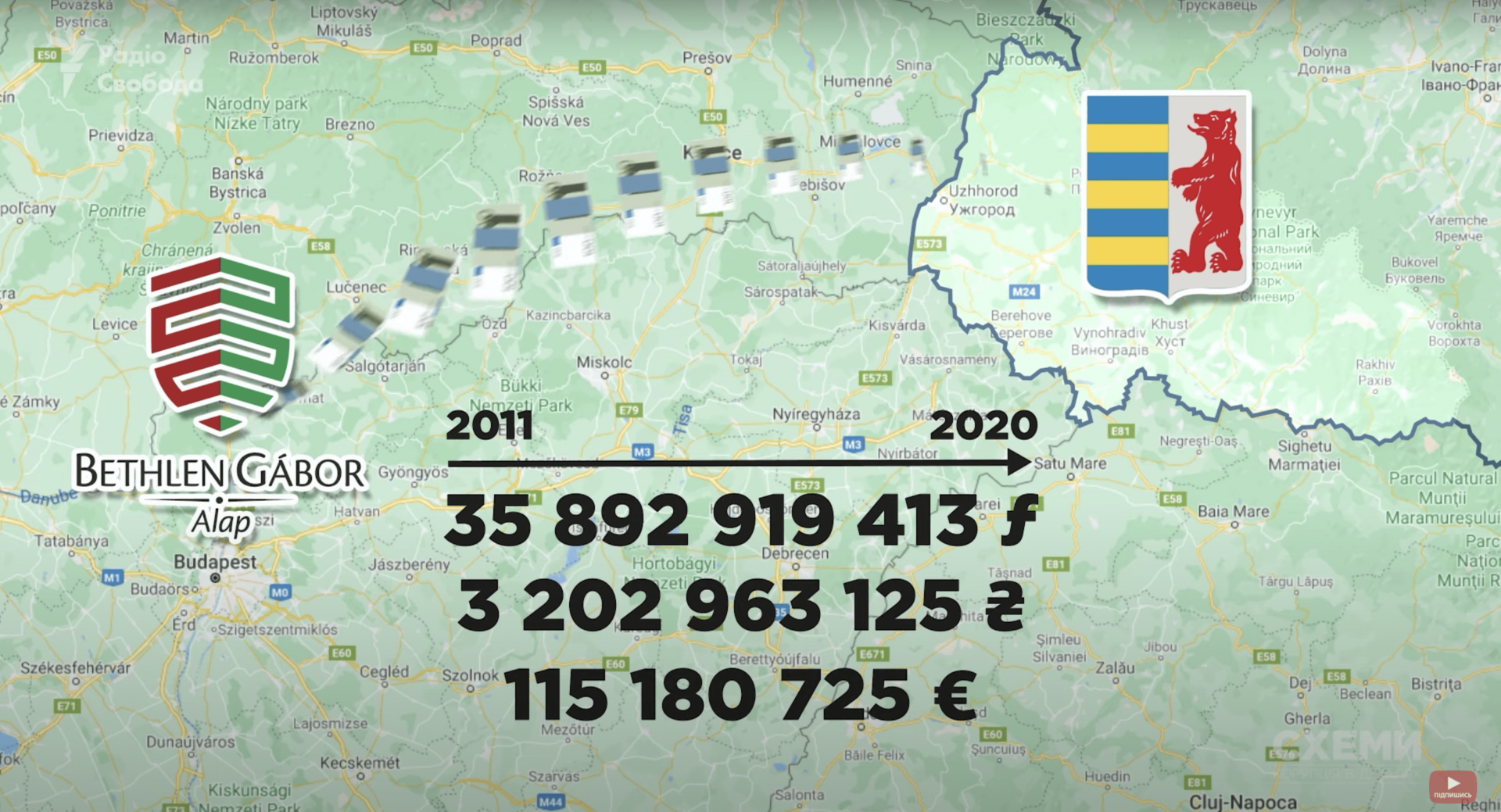
Source: Schemes
According to calculations performed by Schemes reporters, between 2011 and 2020 Zakarpattia received nearly 36 billion forints. That is three billion hryvnia, or 115 million euros. This massive figure is equal to about 1.5 times the annual budget of the Zakarpattia region or the estimated cost of an airport planned for Zakarpattia in the future.
“Starting in 2010, Viktor Orbán developed an extensive policy for supporting diaspora Hungarians, including providing them with money,” said Dmytro Tuzhanskyi, head of the NGO Institute for Central European Strategy, in a conversation with Schemes journalists. “I am not sure if there is a person outside of Orbán’s lieutenants who would be able to count all that money due to the huge number of different programs.”
“Before 2010 the amount of money was not that big. But it grew significantly after 2010; it was absolutely visible from the data,” said Kőváry-Sólymos, the Slovak journalist.
Schemes found that Hungarian money goes to both individuals and organizations. These funds also flow into different areas of the economy. One such area comprises private enterprises in the tourism sector.
A campsite in Dyjda village, which was visited by Schemes journalists, is an example. When the reporters arrived though, it was clear that the campground was not currently operating.
Its owner, Nicoletta Vereb, confirmed in a phone conversation the receival of a grant:
“We received assistance, indeed. We received this assistance a few years ago, and it played a major role. Nevertheless, we had to invest a lot of private savings as well.”
Culture
Culture is another beneficiary of Hungarian money.
“This may as well be the most important Hungarian place in Uzhgorod because it is the Sándor Petőfi monument,” said Andrii Liubka, a Ukrainian writer and poet, showing the monument to the journalists. “Sándor Petőfi is the ‘Hungarian Taras Shevchenko,’ the number one poet, and was an important political activist and a revolutionary. First, he was a genius; second, he was a revolutionary fighter, a soldier; third, he was a representative of Greater Hungary. His biography allows us to draw a map of Greater Hungary. Greater Hungary is a vision of the Hungarian state during its golden age, when it included many foreign territories.”
“Hungarians sometimes say, ‘The Crimea was stolen from you, different territories were stolen from us,’ and in fact Zakarpattia is the smallest among them,” noted Serhiy Sydorenko, an editor at the European Truth media outlet. “Hungary was partitioned based on the Trianon Treaty, which was concluded 100 years ago. Last year, Orbán gathered the people, said in public remarks that Hungarians are strong, lament the partitioning, and want to support diaspora Hungarians. In other words, it is a part of the national idea, and not exclusively the idea of the Fidesz party. It was Orbán who crafted this matter into a paramount theme and now receives public support for this.”
“I would say this is not connected directly to Viktor Orbán, to the governing elite that has been in place for the last 10, almost 11 years now. This was always the case,” Dmytro Tuzhanskyi noted.
There is a Trianon Memorial in Budapest. It is engraved with the Hungarian names of once-Hungarian villages, towns, and cities that now lie outside the borders of the country, including those of many Ukrainian settlements: Beregszász (Beregovo), Munkács (Mukachevo), Rahó (Rakhiv), Nagyszőlős (Vynohradiv), and Ungvar (Uzhgorod).
“I got the idea to create a collection of Ukrainian Hungarian-language literature translated into Ukrainian so that we would be able to get to know these creative people in Ukraine who write in the Hungarian language, but altogether belong to Ukrainian literature,” Andrii Liubka remarked, sharing his thoughts with Schemes journalists. “It takes five minutes to receive money from Hungarians for almost any cause geared toward the interests of Hungarians, such as promoting their culture. And yet, I stand firm, and I think this book will be funded with Ukrainian money.”
The Ukrainian state has not yet approved his idea.
Schemes has calculated that over the last 10 years Hungary has donated at least 2.5 million euros to support cultural activities in Zakarpattia.
Mass media
Currently there are several Hungarian-language media outlets based in this region, as well as publishers who deal with Hungarian themes. The Bethlen Gábor Fund directly supports at least four of them, providing them with a total of more than 66,000 euros. Additionally, the Fund for the Development of Hungarian Media received almost 4,000 euros. A few more outlets are funded indirectly, particularly through the Zakarpattia Union of Journalists, which received more than 117,000 euros. According to our calculations, these outlets received at least 187,000 euros for their operations through the fund.
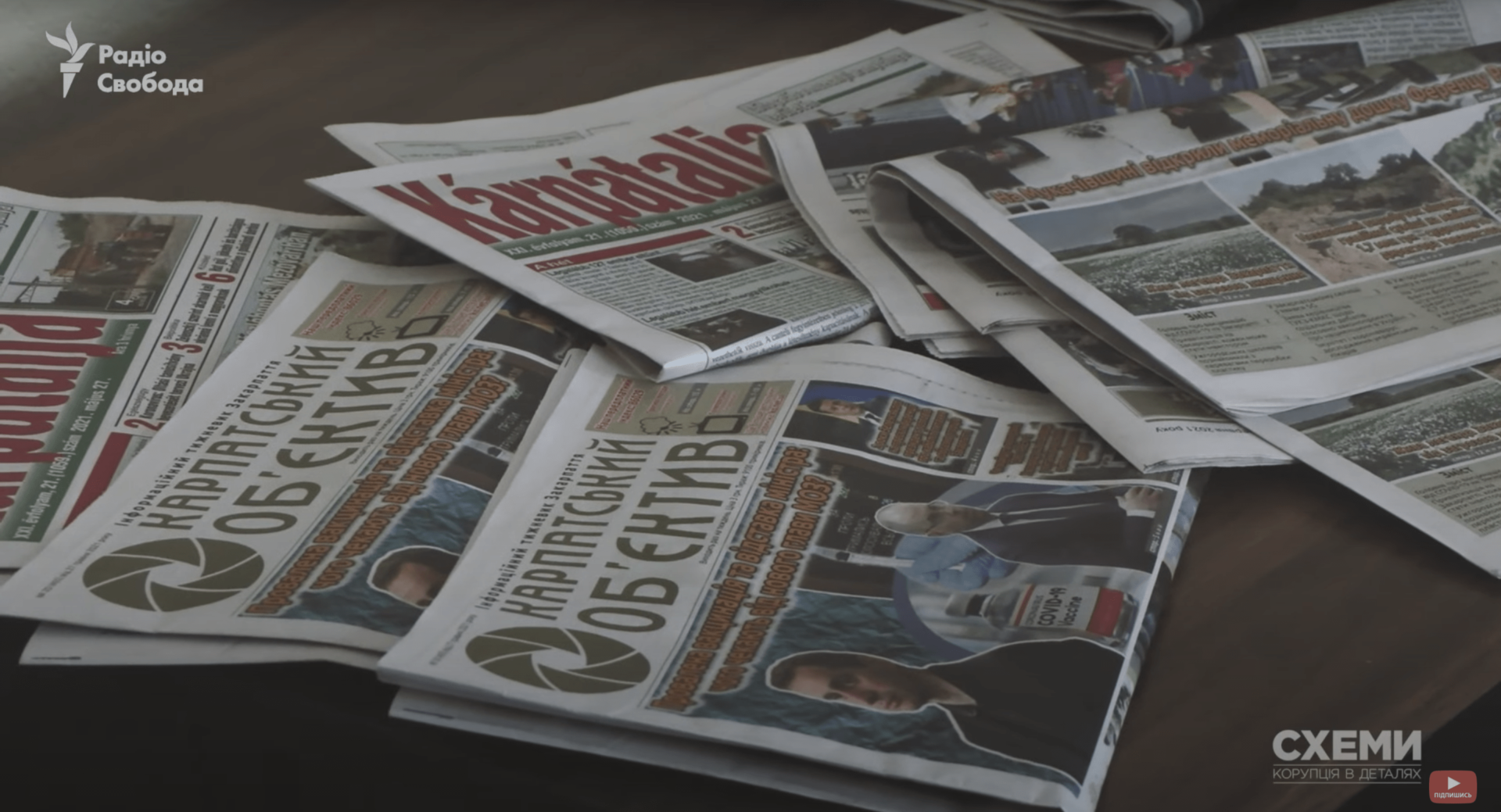
Source: Schemes
“[This funding system] allows the export of Hungarian state propaganda,” said Kőváry-Sólymos. “You can read a lot about Hungarian political life, you can read about the Hungarian opposition, but nothing critical toward the Hungarian government. It is really suspicious.” Some of the Hungarian-government-supported outlets in Ukraine express positive views about the Hungarian government and spread Russian news.
Schemes also examined these outlets’ associations with different Hungarian parties in Zakarpattia. For instance, as Schemes reporters waited to conduct an interview with Josip Borto, deputy head of KMKSZ, a Hungarian party led by Vasyl Brenzowicz, we skimmed through the newspapers Karpatalja and The Carpathian Lens, which were available in the party’s office. Brenzowicz is currently in Hungary, where he is probably hiding from Ukrainian law enforcement, of whom the two aforementioned newspapers are very critical.
Schemes journalists found another paper, Kárpáti Igaz Szó, in the office of another party, the Democratic Union of Hungarians, when they went to meet its leader.
“Most of the newspapers that are published are either funded by readers or receive some sort of grant assistance, especially from Hungary,” László Zubánics, the head of the Democratic Union of Hungarians, said to Schemes reporters. He also suggested that Hungarian-language media in remote regions of western Ukraine were filling a void after Ukraine’s main television channels transitioned to digital broadcasting. He said that such stations are harder to receive in mountainous areas like the Carpathians.
Political parties
Schemes journalists met with László Zubánics in a building that had been renovated with money from the Bethlen Gábor Fund. A few organizations are headquartered there, including Zubánics’s Democratic Union of Hungarians.
“The parties act as our electoral instrument, whereas non-governmental organizations arrange cultural events or other issues – this is a completely different level,” mentioned Zubánics in the interview.
“Hungarian parties compete in local Ukrainian elections,” explained Dmytro Tuzhanskyi. “Two NGOs have transformed into parties for the electoral time being. These are the Society of Hungarian Culture in Zakarpattia (KMKSZ) and the Democratic Union of Hungarians (UMDSZ).”
Schemes asked Zubánics to elaborate on the differences in values between Hungarian parties in Ukraine. He responded, “They mostly revolve around how we treat Hungary and Ukraine. We join forces when our positions overlap.”
Kőváry-Sólymos, in contrast, noted the following: “Solidarity is one thing. The Hungarian government wants to help diaspora communities. It is also connected with the agenda of ethnic political parties in these states: Hungarians in these countries feel themselves to be second-class citizens. They are developing relations with their mother country, and I personally see that some people have started to feel closer to Budapest than to Bratislava or Bucharest. The government is trying to make these communities dependent on its aid.”
The proximity of Zakarpattia to Budapest quite often influences the region’s political life.
For example, in the run-up to local elections in 2020, a Hungarian government representative planned to visit the region to campaign for Brenzowicz’s KMKSZ but was banned from entering the country. The same thing happened to the Hungarian secretary of state and the Hungarian minister of foreign relations.
Moreover, in 2019 Orbán met in Budapest with Brenzowicz, who at the time was running for parliament in Ukraine. This meeting occurred a week prior to election day. Ukrainian diplomats would later call this event proof of Hungarian interference in Ukraine’s domestic affairs.
The support is not limited to the political realm.
In Zakarpattia we find several buildings bought with Hungarian money that are now owned by Brenzowicz’s KMKSZ.
Moreover, according to the database that Schemes gained access to, the Hungarian government funded “the production of KMKSZ billboards” in early 2019. It is not clear which billboards are meant, but at that time election campaigns were underway in Ukraine and members of OPORA, a civic elections watchdog network, spotted a few billboards promoting the party.
“When such money is invested, it certainly presupposes influence and loyalty. This means loyalty in elections, different types of elections. This means there is a group of people whom you supported and whom you can call upon when you need help or votes,” Dmytro Tuzhanskyi said, assessing the situation. “And that’s how it works. It is a funny coincidence that the influx of grant money increased half a year, a year, prior to the elections. Grant money comes in regularly, but that’s when there is a spike.”
Hungarians deny that government funds from Budapest are used for political activities. This is illegal in Ukraine. And yet, as Schemes has pointed out, the leaders of Hungarian non-governmental organizations, of charities funded by Hungary, and of Hungarian parties are the same exact people who sit in the same exact buildings and offices.
The Bethlen Gábor Fund invested the most money in Zakarpattia in 2017 and 2019. This may be coincidental, but 2019 was an election year in Ukraine, whereas parliamentary elections in Hungary occurred in the first half of 2018. But why are Hungarian elections of interest?
Elections
During the Zakarpattia trip, Schemes journalists got to know a resident of Beregovo who is a dual citizen of Hungary and Ukraine. Because in this region no one is open about such matters, he declined to speak on camera.
“My father was born in Budapest. Therefore, a month after he received citizenship, I did, too,” he told the reporters.
“I would say it is a permanent campaign. As you know, in 2010 the Fidesz government changed the law to allow for dual citizenship. This is illegal in both Slovakia and Ukraine,” said Slovak journalist Karin Kőváry-Sólymos. “You get the Hungarian passport – some say – okay, it is a simple legal thing, but not so quick. Since you are also granted the right to vote in parliamentary elections, it is more than a simple legal status at this point. Votes from those people, according to our calculations, add up to two or three seats in the Hungarian parliament. If you want to get a constitutional majority, these are really important votes.”
Ukrainians who have Hungarian citizenship can vote in Hungarian elections via post or in person.
Róbert Bathory, from the Budapest bureau of Radio Liberty, documented how in 2018 Ukrainians were transported to Hungarian border villages.
“I discovered these statistics showing many more people living in the dying villages of Szabolcs County than before. So, I went to these villages and found hardly any residents. Many people who have acquired Hungarian citizenship since 2011 have moved into Szabolcs County from Ukraine, but they live in Hungary on paper only. Many became Hungarian citizens, but for that you also need a Hungarian address, and these were sold to these people for money. For example, there are almost 340 people registered as living in the ruins of a house here. According to many opposition MPs, there are tens of thousands of ghost Ukrainians in Szabolcs County who have been used by Prime Minister Viktor Orbán’s Fidesz party to rig elections for almost 10 years. We haven’t gotten any answers from the Hungarian government about these questions,” the journalist told us.
This affair is not unique, said Bathory: “Can you imagine that in Szabolcs County there are 150 villages, and every village is infected by these ghost Ukrainians. This is the method used in Ukraine, Romania, Slovakia, and Serbia, too. So, if you count these voters, you can sum up that it’s almost 1,000,000 people from abroad who can vote for Fidesz.”
“Orbán’s government constantly tries to mobilize voter support by bringing in Hungarians, whom they do not consider to be diaspora Hungarians, by the way,” said Pavlo Klimkin, minister of foreign affairs of Ukraine in 2014–19. “Zakarpattia, in particular. Thus, most of them have Hungarian passports and vote for Fidesz, which is in power now.”
Migration
“Giving out passports was a good method of hybrid influence,” remarked Andrii Liubka. “But on the flip side, a person to whom such a passport was granted, the first thing they do right after, they pack a suitcase and leave, but not for Hungary.”
UMDSZ’s head, László Zubánics, expressed concern about the large-scale migration of Zakarpattia Hungarians: “It is a very negative development that these people are gradually bringing their families with them, and in every town or village from 10 to 50 houses are for sale.”
It appears though that Hungarian material support has put emigration on hold.
“These opportunities to receive charitable assistance – it allowed businesses to make the right decisions to remain and work in Ukraine,” said Beregovo mayor Zoltán Babják.
This tendency is well captured by the story of Zakarpattia winemaker Ruslan Orosz.
“Winemaking started as a hobby. My wife and friends said, ‘You make great wine,’” recalled the man. “I have been making wine and growing grapes for more than 10 years now. I am a local, I went to a Hungarian school. I work mostly on my own, and I employ seasonal workers in the summer.”
– “Do you employ a lot of people?” the journalists asked the winemaker.
– “Not at all, to tell you the truth. It is difficult to find a lot of people whatsoever.”
– “Why?”
– “Everyone is abroad now,” replied Ruslan, confessing, “I was considering this as well, but due to the nature of my work I cannot leave even for a single day. Wine, grapes. You have to work day and night.”
When asked if he had approached Ukrainian or Hungarian authorities for assistance, he answered:
“I was trying to figure it out, if there is some Ukrainian help. I have friends who make wine. They tried to get a Ukrainian grant, but it is not clear if there will be any. So, we decided that it would be better to organize all this stuff through the state of Hungary, if there is a possibility. That’s why we contacted the Hungarian state. There is a charity fund that gave us equipment for winemaking.”
What is the end goal?
“They are creating a parallel state,” offered Andrii Liubka. “There is a parallel administration that penetrates all spheres and not only exercises effective control, but leads them and funds them, unlike the Ukrainian red-tape state…. This parallel state creates its own policies, renovates schools, provides medical supplies to doctors and Hungarian retirement pensions, all these grants, school trips, everything in every realm. This creates a foundation for this community and allows the Hungarian government to control it.”
Visits by Hungarian civil servants are not rare.
During the one-week trip by Schemes journalists to Zakarpattia, they met Orbán’s chief of staff, Gergely Gulyás, who was there for the ceremonial opening of the renovated Hungarian house, for which Hungary bought an entire building in the center of Mukachevo.
The investigative journalists asked this high-ranking official about the aims of his government’s massive funding activities in this Ukrainian region:
– “You know that we have strong diasporas all around Hungary, outside the existing border of Hungary. Therefore, it’s a really important task for the Hungarian state to support its diasporas. This is our constitutional duty. I think it is not only an opportunity for the Hungarian state but a good privilege for Ukraine and other countries who can enjoy this support from the Hungarian state,” he responded.
– “Some experts say that you use Hungarian jurisdiction in neighboring countries for such activities. Don’t you think so?”
– “No,” he reiterated.
“The aim of Budapest is to define an invisible border, this area, and to make it Hungarian,” supposes Ukrainian ex-minister of foreign affairs, Pavlo Klimkin. “In any communal office you will encounter three flags: our flag, the EU flag, and the Hungarian flag, which is considered to be a symbol of the Hungarian identity. But in fact, it is just that – the flag of Hungary. There is a clock in Beregovo town hall. It is set to Budapest time.”
The mayor of Beregovo, Zoltán Babják, responded to such criticism with the following words: “Beregovo and Beregovo district are always in the spotlight. Frankly, we would be happy to get attention due to our economic or social progress, and not due to political affairs.”
Karin Kőváry-Sólymos also remarked that the existence of parallel structures “creates parallel realities…. It can also polarize the community.”
But one of the most polarizing issues in Zakarpattia is that of education.
Education
The Ukrainian parliament passed the Education Act in 2017. According to it, the official language of instruction nationwide should be Ukrainian, even among ethnic minorities. This new law caused a burst of outrage from Zakarpattia Hungarians and from the Hungarian government.
“This [law] caused troubles in relations between Hungary and Ukraine,” claimed Josip Borto, deputy head of the KMKSZ faction in the Zakarpattia Regional Council.
“The idea of a stand-off with us, with Ukraine, gives them the upper hand. This allows for mobilization in Hungary proper, in Hungarian society, but for what? To claim that the state is a ‘hard-liner when it comes to the rights of Hungarians.’ A significant part of Hungarian society buys into this notion,” claimed Ukrainian ex-minister of foreign affairs Pavlo Klimkin.
“Hungarians are anxious about assimilation. It is omnipresent. They understand assimilation as the absence of access to information in their mother tongue, education in their mother tongue. If you cannot use your mother tongue, you are assimilated,” remarked Dmytro Tuzhanskyi, head of the Institute for Central European Strategy.
Indeed, the Schemes team encountered language barriers on their quest to find Zakarpattia Hungarians funded by the Hungarian government. For instance, on one occasion these journalists struggled to locate a cheesemaking workshop in the village of Schom and therefore approached locals for directions. The villagers, however, were only able to help them in Hungarian.
“Kyiv left this problem for good and had no national policy whatsoever,” claimed Serhiy Sydorenko, an editor at European Truth. “One cannot deny the existence of Hungarians. This is the reason locals do not need the Ukrainian language. In Soviet times, everybody spoke Russian, and everything was fine, but now they do not speak Ukrainian.”
The journalists eventually made it to the workshop, but the owner was not present. Nevertheless, they confirmed that even rustic businesses in Zakarpattia can indeed receive funding from the Hungarian government.
“They say, ‘We do not want to blur our identity.’ But better knowledge of Ukrainian does not blur identity,” Pavlo Klimkin stated. “Some young Hungarian businesspeople approached me, asking, ‘Mr. Klimkin, what shall we do? We are not even capable of doing our taxes. We employ a person who speaks Ukrainian.’”
A journalist from Schemes attempted to speak with the owners of a local flower shop that received public funds, but they were not at the facility. The Hungarian-speaking employees did not want to converse with the journalist at all.
Josip Borto, the deputy head of the KMKSZ faction in the Zakarpattia Regional Council, denied the very existence of this issue: “We all understand each other here; there is no language problem. This territory belonged to Austro-Hungary, Hungary, Czechoslovakia, the Soviet Union, and now it is a part of Ukraine. There were five different countries, and therefore, we had to learn the official languages. Everyone who wants to live at home and in Ukraine must learn the state language. This is a must.”
Ildikó Orosz, a KMKSZ member on the Zakarpattia Regional Council, voiced similar thoughts: “I am a living example for you. I never learned the Ukrainian language. Because I am a product of Soviet times. Back then, we had the same grievances as Ukrainians; we were in the same situation. Therefore, I do not get it now, why they do not understand this situation.”
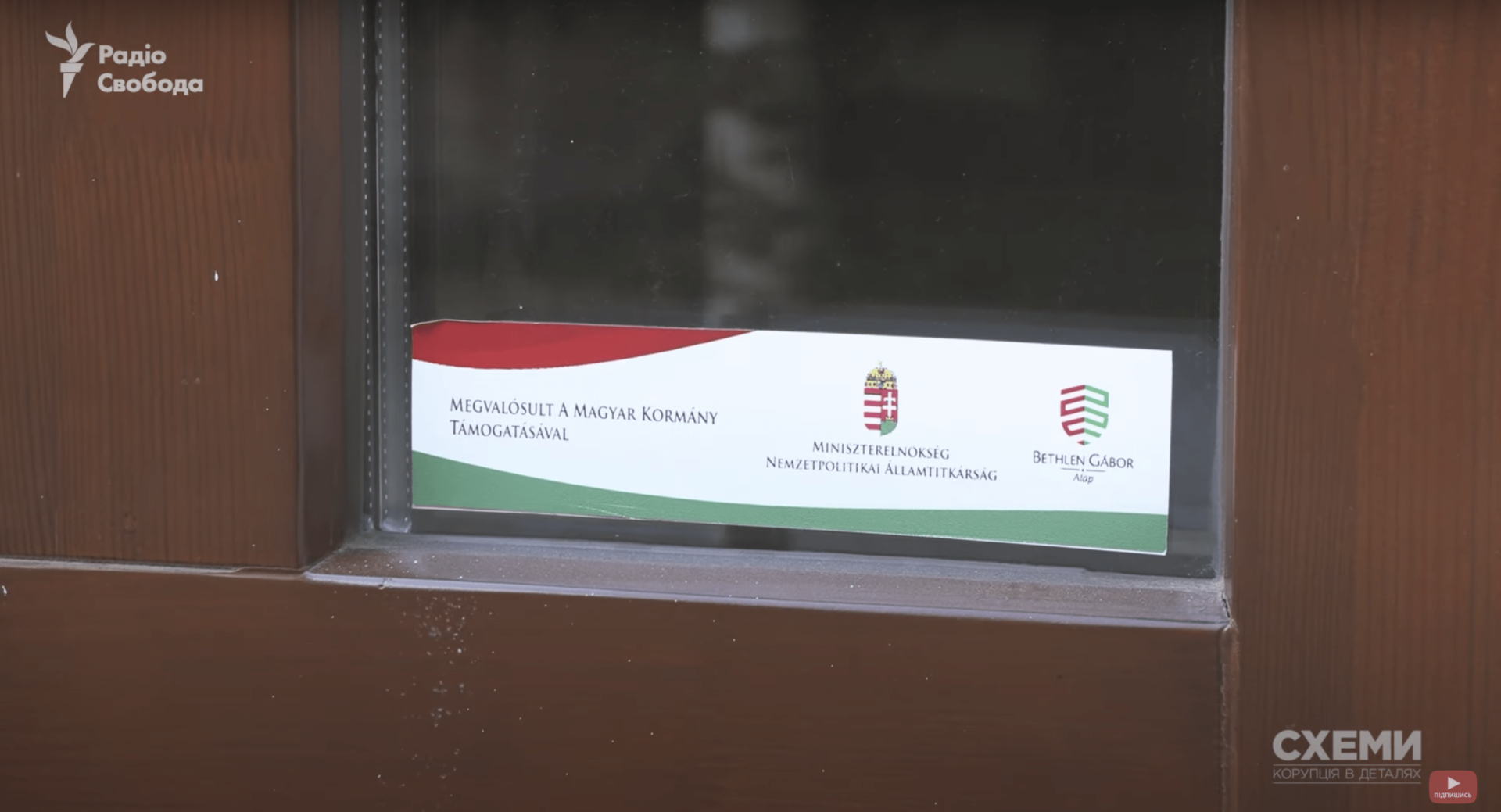
A sign on the door of a local school stating that it has received funds from a Hungarian foundation. Source: Schemes
According to calculations performed by Schemes, more than one-half of Hungarian state grants awarded in Zakarpattia – which amount to at least 62 million euros – have been spent on the maintenance of educational facilities, educational programs and trips, textbooks, and the construction of schools and kindergartens.
For instance, the building of a kindergarten in the village of Nyzhny Koropets is owned by the Zakarpattia Hungarian Language Pedagogic Union. In 2017 and 2019, it received approximately 9.8 million euros from the Hungarian state fund to construct and renovate kindergartens.
Ildikó Orosz, mentioned above, heads the Zakarpattia Hungarian Language Pedagogic Union and is the president of the Hungarian Institute in Beregovo, which received even more funds, 34 million euros.
– “You know the situation in our country – there is no money. That’s why this fund helps. For instance, the Rákóczi Ferenc II Hungarian Institute receives money and pays the most taxes to the Beregovo city council, although we do not receive support from the state.”
– “Nothing at all?”
– “Nothing at all, not a penny for 25 years. We received nothing, although we pay taxes.”
The Democratic Union of Hungarians in Ukraine’s head, László Zubánics, reacted in a similar vein: “For instance, a rural family has a good, talented child. The child goes to study at the institute in Beregovo because it is free. The Hungarian state pays. Whereas here, for instance, at the [Ukrainian] state university the education is not free. Where will the child go?”
In addition to funding educational programs and facilities, the Hungarian government also provides social workers – teachers, medical staff, and librarians – who know Hungarian with financial bonuses.
This caused a scandal earlier this year. Hungarian journalists made it public that more than 100 such social workers in Zakarpattia did not receive the bonus. This was connected to their political positions, since they voted for non-Hungarian parties in the last elections. Hungarian government representatives declined to comment.
Schemes journalists attempted to contact the affected teachers, but they declined to comment as well.
Josip Borto explained the situation to the journalists: “The applications were submitted; these applications may be accepted or declined. The bonuses are given out by Hungary. Those who give are those who decide. We only collect and process these documents. We petitioned for a partial reimbursement. These people received reimbursements. We voiced our concerns regarding this inequality so that it will not happen again this year because it hampers our activities and makes for bad press. Everything calmed down and will not happen again,” he said.
Official comments from Kyiv
What do officials from Kyiv have to say about the Hungarian issue in Zakarpattia? Do they see any problems or dangers in the region?
President Volodymyr Zelensky commented briefly on this issue while speaking about his massive road construction project during a recent press conference:
“Nothing was done in Zakarpattia. Nothing. There is nothing! When I first came there as president, there were no hospitals, no big production sites, no roads. And all these people see Hungary, as they go there daily, they see that there is everything in Hungary! Good Hungarians! Do I want anything bad? I want them to be Ukrainians. I want them to remember that they are a Hungarian minority, in Beregovo, for instance, right? But they should be Ukrainians. So that they would not want to accept those passports. The dissemination of passports was happening there for many years, I tell you. I want them to feel that the state cares about them – that is what I want. Hence, the roads. But not only the roads. I am considering special economic zones. That’s true! For Donbas and for Zakarpattia!”
Serhiy Sydorenko from the European Truth media outlet weighed in on the president’s remarks: “It is simply not true that Kyiv does not fund Zakarpattia at all.”
“There is a narrative according to which Zakarpattia as a region is a child that is not cared for, given little attention, feeble efforts. That is not the whole story,” said Dmytro Tuzhanskyi. “It is important to understand that critical infrastructure is funded by Ukraine. Some argue that only Hungary funds Zakarpattia, even the roads. That is not true. Hungary does not fix roads here. No one actually does, although this started to change in the last few years. Roads and hospitals are built. Investments started to flow into Zakarpattia not in the last two years, but since the Revolution of Dignity.”
During the trip, Schemes reporters visited the village of Yanosh. There they met Tibor Birov, the owner of Helicon hotel.
“After the dissolution of the [Soviet] Union, there was a plan to demolish this building. As a resident of this village, I could not let this happen. That is how I got the idea to create a great hotel complex in the vicinity of Beregovo,” he said, recalling how his business started.
– “Do all Hungarians who come to Zakarpattia visit you?” the journalists asked.
– “Not every single one, but many do, and even if they do not stay here, we have something to do with their visit. This is the grandson of Count Otto Habsburg. This is Doctor Szili Katalin, former deputy head of the Hungarian parliament. This is the former president and incumbent prime minister Viktor Orbán. Here are some musical ensembles,” said the hotel owner, showing us photos of his famous guests. “That’s not all the people who have visited us, but the pandemic made us think. We decided to collect these valuable photos and present them here.”
Tibor Birov received funds from the Hungarian state to further develop his business. This is what he told Schemes reporters: “We are very proud that we won this grant, that we managed it…. I prepared for you a list of documents indicating what we were able to buy with this grant. The Bethlen Gábor Fund has a condition that we must create jobs. This is very important. We would be very happy to receive support from Ukraine as well. We are a part of the Ukrainian economy. Hungarian taxpayers are not simply supporting diaspora Hungarians; they are supporting the Ukrainian economy, you see.”
“It is a paradox of Hungary’s funding activities in Zakarpattia that despite not setting any political conditions they have been able to accomplish political goals,” commented Andrii Liubka. “When local businesspeople receive Hungarian funds for their business activities, they think they will be forced to swear allegiance to Orbán, Hungary, such an ideological concept, but this is not the case. Having received the money, without bribes, without obligations to serve Hungary, they think and make everyone around them think ‘Look, Hungary is a cool state without imperial aims’ and thus turn into the foot soldiers of Hungarian influence locally.”
A similar opinion was voiced by the ex-minister of foreign affairs Pavlo Klimkin: “This works. Of course, it does. There are a lot of small projects, but we also know very well that some infrastructure projects that Hungary is involved in could be corrupt.”
Football and criminal proceedings
As we have explored, Hungary financially supports many aspects of life in Zakarpattia: religion, education, the media, non-governmental organizations/political parties, and private businesses. But there is one more special area receiving money. Football.
“The football academy and the stadium are funded. Football is Orbán’s guilty pleasure,” noted Slovak journalist Karin Kőváry-Sólymos, referring to the Munkács (Mukachevo) Football Academy.
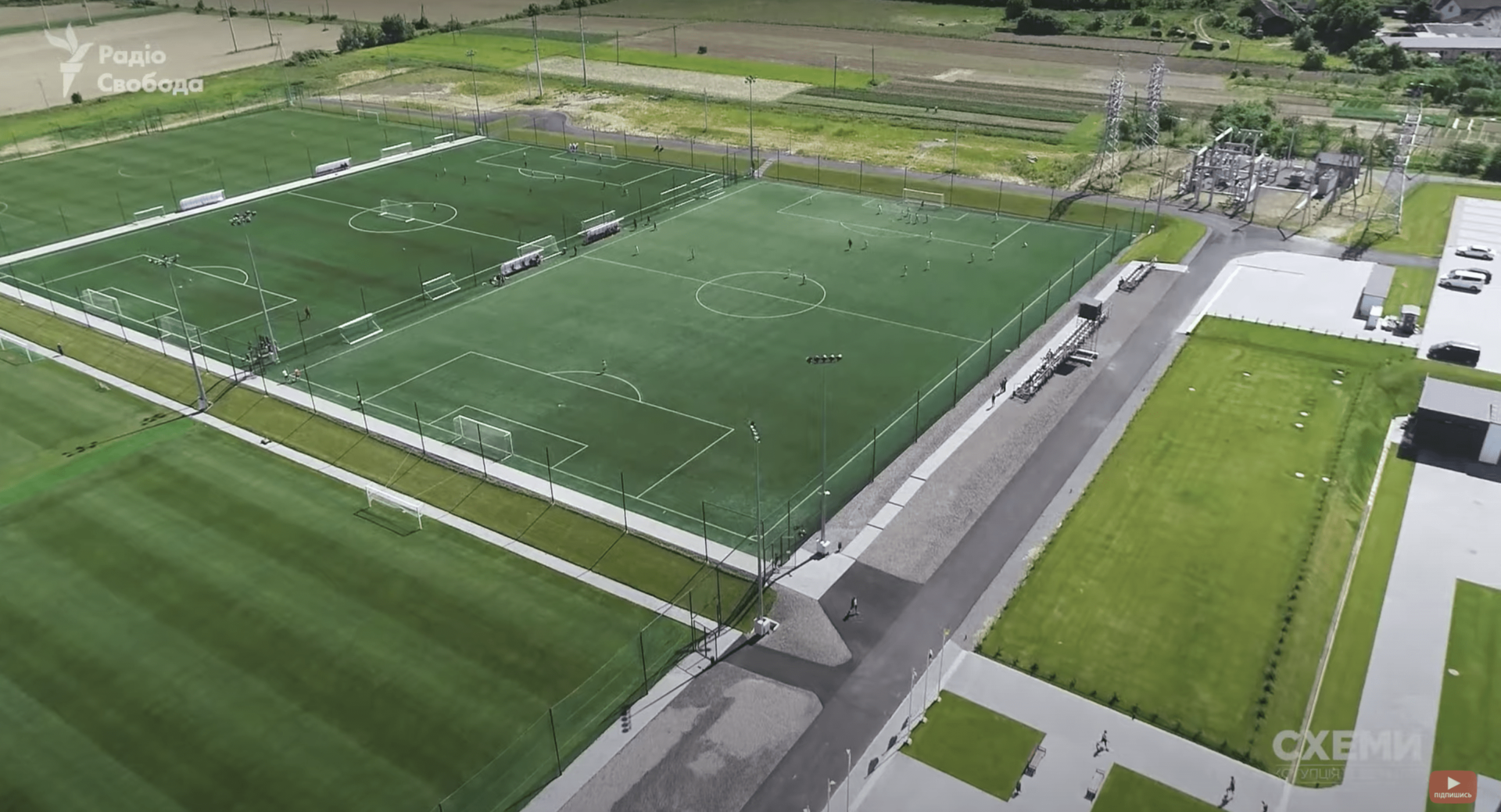
Munkács (Mukachevo) Football Academy. Source: Schemes
This academy belongs to a few Hungarians from Budapest. All football players from Zakarpattia come to Mukachevo to improve their skills. But Ukrainian law enforcement agents have been here too, but they were not interested in sports.
According to one court ruling, the Hungarian Football Federation and the Bethlen Gábor Fund regularly funded the academy, in 2017–18 providing it with a total of 8 million euros. In Zakarpattia the project was managed by a charity fund that is connected with the academy via its board members. The tax authorities noticed that more than 4 million hryvnia were transferred to the bank account of an 80-year-old woman who lives here. However, she claimed to know nothing about the money. Investigators discovered that the charity’s managers used her personal information to withdraw the money. Nevertheless, the court found the woman responsible for counterfeiting the bank documents.
This is not a rare case.
“Court databases contain [documents related to] administrative and criminal proceedings originating in 2018–21, which mention the Egán Ede and Bethlen Gábor Funds. In these proceedings, evidence of probable counterfeiting and tax evasion are described,” explained Olena Mudra, an investigative journalist from Zakarpattia. “The neighboring country is not interested that much in the ways in which its taxpayers’ money is used in Ukraine.”
László Zubánics, the Democratic Union of Hungarians in Ukraine’s head, holds another opinion: “These are public funds that the state allocates for certain purposes. The use of these funds is very strictly controlled, but, as they say, the devil does not sleep. Everything can be done, but not at the level of the beneficiary.”
“When it comes to money, there is a question of transparency,” stated Dmytro Tuzhanskyi, head of the Institute for Central European Strategy. “Whether taxes are paid, whether the money is really used for the purposes stipulated in the grant agreements, whether there is corruption that Ukrainian law enforcement agencies accuse Hungarian leaders of.”
Law enforcement officers have also accused Hungarian leaders in Zakarpattia of separatism.
As mentioned above, the head of KMKSZ, Vasyl Brenzowicz, fled to Hungary, where he is hiding from investigators.
“They accuse our leader, among other things, of separatism. They opened [criminal proceedings] against our charitable foundations. We have three charitable foundations; criminal proceedings are open against all of them. The charges are very serious,” Brenzowicz’s deputy, Josip Borto, said.
Schemes journalists acquired more information on the proceedings from the Security Service of Ukraine.
“Investigators from the Security Service of Ukraine are checking information about the involvement of a foreign charitable foundation and its officials in activities aimed against the sovereignty of the Ukrainian state. Currently, criminal proceedings have been opened under two articles of the Criminal Code of Ukraine, ‘treason’ as well as ‘funding actions committed to forcibly changing or overthrowing the constitutional order or seizing state power in Ukraine,’” security service spokesperson Artem Dekhtyarenko told journalists.
Searches were conducted in several offices, foundations, and the home of KMKSZ leader Vasyl Brenzowicz. Journalists from Schemes recovered a list of property seized during the searches conducted based on Brenzowicz’s arrest warrant. According to investigators, personal documents and money Brenzowicz received from Hungary through a local foundation he headed were confiscated from his house. According to the Security Service of Ukraine, they “were used to finance actions committed to forcibly changing the state borders of Ukraine.”
Brenzowicz publicly argued that the charges brought against him were politically motivated, whereas his defense is appealing everything in court. In the meantime, the State Security of Ukraine is conducting further investigations.
“Kyiv at some point became disappointed in Hungary’s willingness to seek a compromise and began to act improperly. Because it is improper to involve the security service,” said international affairs journalist Serhiy Sydorenko. “Apart from this particular case, I must admit that Brenzowicz, unfortunately, has become a very negative figure in Ukrainian-Hungarian relations. He undermines these relations to keep finances flowing and not to do good for the Hungarians of Zakarpattia.”
Should separatism be a true concern?
This is what Schemes journalists asked the head of the Zakarpattia Regional Council, Oleksii Petrov.
– “Bearing in mind my 27 years of experience in the secret service, when someone raises the issue of such risks, it means that he does not believe in the capabilities of his secret service. I am not ready to say if there are any risks,” he replied.
– “But at the same time the secret service itself speaks in connection with these cases about such risks.”
– “Well, look, the doctor should always talk about the patient’s illness, and not about the feeling of being healthy. Yes, indeed, it is an element of prevention.”
Who is exacerbating tensions?
Borto claimed to Schemes journalists that in recent years some provocateurs have been exacerbating tensions with Zakarpattia Hungarians, mentioning popular violent anti-Magyar slogans, provocative posters and billboards, and even acts of terrorism – arson and the bombing of his party’s office.
– “Don’t you think that Russia might be involved in this?” he was asked by journalists from Schemes.
– “We don’t know who does this. If it’s the hand of Moscow or not, we don’t know, but we do believe this is the hand of Moscow. We are citizens of Ukraine. Who should protect us from such provocative actions of a foreign state? Isn’t it law enforcement? And why have there been more than one hundred such acts in the last three or four years?”
Pavlo Klimkin also spoke about Russian influence in the region: “Russia consistently provokes, or, you know, hangs posters there, arsons. There is a desire to inflate emotions in Zakarpattia, and it will always be there.”
Dmytro Tuzhanskyi balanced out the discussion: “Russia is not behind all these provocations. One shall understand this, and yet Ukraine is at war and our enemy is Russia. It is at war with the whole civilized world. Of course, there is a threat. It is the classic divide-and-conquer approach, when you set the people against each other, when you provoke misunderstandings. There are speculations that if you don’t need Zakarpattia, give it to Hungary. These are exactly the speculations which were used in Crimea.”
This is not the first time though that thoughts turned to whether the Crimean scenario would be repeated in Zakarpattia. The question looms, is pro-Hungarian separatism threatening the region?
Josip Borto countered: “Hungarians make up 10 percent of the population of Zakarpattia; 80 percent of the population are Ukrainians. On which grounds would Hungary theoretically annex Zakarpattia? Who would give permission for that and who would vote that we want to go to Hungary? Eighty percent do not want to separate, and we do not want that either. You said 100 million euros are flowing into here, and there is no need to return anything? Is this bad? One should rather say “Thank you,” I think. What separatism? Who is arranging such actions? When it is said that the Hungarians want to annex or take Zakarpattia like Russia took Crimea, it is ridiculous. Hungary is a member of the European Union and NATO. Who will allow them even such attempts? Who, who will allow them?”
László Zubánics, the head of the Democratic Union of Hungarians, said, “Where you are, there is your homeland. We want to be here and to consider our Zakarpattia and Ukraine fatherlands and mortherlands.”
“They are Ukrainian Hungarians. To all those who speak about the unity of Ukraine, I tell the story of how many Hungarians died in Donbas and how many of them had Hungarian passports,” ex-minister of foreign affairs Pavlo Klimkin said in a conversation with Schemes journalists.
Scholar of tourism Maksym Adamenko brought the journalists to the ethnically Hungarian village of Dercen in the Mukachevo district. It is a special place, he explained: “This is an ethnically Hungarian village. A very picturesque and emotional place. In 2009, Ukraine and Hungary signed a memorandum on the memory of generations, the memory of descendants, and as a result, this memorial was built. This is called the European Reconciliation Park. The purpose of this park and this memorandum is communication between people and not quarrels and wars. It is built in memory of all those killed in both wars on both sides.”
What do Zakarpattia Hungarians who have received funds from Budapest think about this matter?
The owner of Café Pid Zamkom, Yurii Rusnak, stated, “They talk about separatism in Zakarpattia. I answer, ‘Maybe, tell me. I have not heard about it.’ People live peacefully in this Babylon, and I hope that it will not fall apart. Zakarpattia is a complex region in what sense? That people do not have jobs and go abroad? It’s true. Why is someone here marching with flags and calling for separatism? This is nonsense. I am a citizen of this country, a patriot of this country, and I am proud to be Hungarian, because I grew up in a Hungarian community. But I am a citizen of Ukraine. An active citizen of this country.”
UPDATE 20.07.2021: The reply from the Gábor Bethlen Fund
In the Fundamental Law of Hungary it is stated that Hungary bears responsibility for the fate of Hungarians living outside its borders, promotes the survival and development of their communities, supports their efforts to preserve their Hungarian identity, the assertion of their individual and community rights, the establishment of their community self-governments, as well as their well-being in their homeland, and promotes their cooperation with each other and with Hungary.
Grants to the Hungarian ethnic community in Ukraine are made in a clear and transparent manner, in compliance with the applicable Ukrainian legislation, through foundations and NGOs registered in Ukraine and holding a license issued by the Ukrainian authorities. They are aimed at helping the Hungarian community in Ukraine and Ukraine, now experiencing grave difficulties. The Ukrainian community living in Ukraine and in Transcarpathia also benefit both directly and indirectly from the grants. The school development, kindergarten refurbishment and medical clinic renovation programmes have included the renovation of Ukrainian state- and municipality-owned properties as well. The economic development programme has helped Ukrainian entrepreneurs of Hungarian ethnicity to create jobs and contribute to the strengthening of the Ukrainian economy.
Neither the Hungarian government nor Bethlen Gábor Fund Management Ltd. is aware of any “corruption cases” in connection with the subsidies provided to the Hungarian community in Ukraine. Given the fact that aid to the Hungarian community in Ukraine is provided in a transparent manner, in full compliance with the applicable Ukrainian legislation, investigations by the Ukrainian authorities into so-called “corruption cases” may be politically motivated and may place Ukraine’s Hungarian community under pressure.
Read the original article in Ukrainian on radiosvoboda.org

